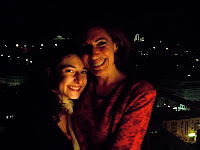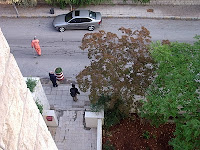June 29, 2010
I suppose it’s all of life, really, but there are certain pilgrimages we single out. The hajj -- the journey to and from and back to Mecca – is one of them and one way or another you’ve been on that route with me before.
So here are two other small pilgrimages from this year’s great one: PART ONE, Jerusalem; PART TWO, the Baptism Site on the Jordan River.
All pilgrimages include the trial of travel. Adventures along the path are inseparable from the achievement of destination. For Katie and me the physical journey to Jerusalem in March was arduous and revelatory. Everything you’ve heard about checkpoints, blockades, the wall, and humiliating treatment of indigenous and visiting Palestinian population is true. Sometimes those humiliations are graciously extended to anyone perceived to be “one of them,” too.
Crossing the King Hussein Bridge (aka “Allenby”) is a short bus ride across one of the world’s widest partitions. A no-man’s-land of dry, hacked off hummocks and razor-edged barbed wire keeps us officially apart.

It’s a great contrast to the welcoming vista across the Dead Sea, from where on a rare clear day we can see the Jerusalem skyline.
The twenty-something Israeli girl at the immigration counter grilled us for half an hour about where we were going and where we were staying. Where is your husband? Where was he born? Do you fly out to the USA from here? (Is this what they call an interrogation?) After repeating my answer as clearly as I could, surrendering our passports, showing her the phone numbers of my local contacts, I finally asked if she’d prefer we stay somewhere else? Did she prefer we return to Jordan? I bit my tongue on “Do you want me to marry someone else?”
It’s interesting how the repeated questioning works on the brain. I actually began to second-guess myself: what are my real intentions? I begin to sense the torture of torture although I've come no where near, alhamdulillah!
A long line was building behind us, including the kind Palestinian businessman who offered us the spot ahead of him on the cue. See where his random act of kindness got him?
Our intention was to go to Jerusalem, transfer to Bethlehem, stay the night at Mary’s House, and then walk 30 kilometers or so along the Masar Ibrahim el Khalil in Palestine with Hijazi Eid. We’d spend the night in a village along the way, complete our walk and return to the convent. The next day we would spend in Jerusalem and return late to Amman.
We intended to see, sniff, taste, and inquire just a bit about life “over there.”

Details of the trip fill pages in my nightly journal. From Bethlehem we drove the “Palestinian by-pass” road that steers the indigenous population away from Jerusalem, to a pathway up a hill just south of Awarta to begin our walk. We clambered over the remains of Bronze Age settlement s (3200-1200 BC) and in the distance saw the burgeoning Zionist settlements of today.
I know everyone has lots to read and I’m grateful you’re with me as much as you are, so I’ll just share a few lines from my notes on our walk through Duma to Wadi Kelt:
March 5
Forget breaking bread together. Women make beds together on their knees! Habib’s mother brought in the mattresses and blankets. The same thin mattresses that we’ve seen everywhere from Wadi Rum to Rasun village in Ajloun, Jordan. We’re in Duma, which means, “rest.” Habib, our host, has two home compounds. This one is for his mother and wife #2, with four daughters. Wife #1 is apparently in another town with three daughters. A wonderful grain and chicken soup for dinner soothed some of the ache of 12-14 miles up and over the hills. No wonder people fight over this landscape.

It looks like there’s enough room for everyone here: an Arab village, an Israeli settlement. Neither intrudes too much, as long as the buildings are flat and low. Even the water problem can be addressed, says Hijazi. “But they don’t want us here.”
Hijazi says the Israelis may build the wall through here, splitting the magnificent view and the people from one another, also the animals from their migratory routes. We saw gazelle!
March 6
Habib traded in Katie’s totally worn-out sneakers for a pair of his daughter’s Velcro-close solid sole sneakers. By the end of the walk the backs of her heels were “compromised” and the soles of the shoes, too. But nothing stopped us until lunch. Saw Canaanite tombs, caves and caverns.
March 7
At the checkpoint en route Jerusalem. We took the public bus with the occupied population. I would say “locals” but Israelis are “locals” too. Katie and I both had scarves over our hair because we planned to go to the Dome of the Rock to pray. As cars with Israeli licenses whizzed by, however, our bus was stopped and all of us stepped off. Katie and I were last on line to be inspected. The soldiers went through everyone’s everything. Except when it came to us. Katie “never felt so happy or so guilty to have an American passport.” I kept a stony face when I took off my sunglasses to look the IDF teenager in the eyes. As I stepped back onto the bus, the IDF guy broke into the song that was blasting on the radio: “That’s the power of love!”

The Dome of the Rock is more beautiful than I remembered. After walking around and taking some photos we went in. We prayed four rakats in gratitude then looked around and saw the place was filling up. Noon prayer was coming. Both of us wanted to stay. We prayed, together, with hundreds of others and a baby boy who would rather have been nursing. Katie, who had practiced saying The Fatiha, the opening chapter of the Qur’an,” read it in Arabic from one of the many available inside.
Then we wandered the narrow, kitch-filled streets. At some juncture the “Palestine” and “Dome of the Rock” key chains and post cards transformed into menorahs and Israeli flags, with Mother Mary and Via Dolorosa souvenirs coming in second. Looking around we were the only ones with scarves; too much leg and cleavage for my taste. But behind the counters Arabic was spoken.
***
All pilgrimages include the trial of travel. Adventures along the path are inseparable from the achievement of destination. The destination on this journey to Jerusalem turned out to be our return home to Amman: wiser, somber, enlightened, and grateful.
 Well my friends. It's the end of 2010. I've been home for just about six months and I see I've not filled in for you what it's been like being back. It's hard to describe re-entry. At first all seemed utterly easy: hearth and home were as if I'd not left (except that Peter had redone our bedroom ceiling and walls - that was a treat!), the neighborhood looked the same,everyone speaksks English. It was the Fourth of July weekend when we landed and so we were ushered into a celebration of America, guests, fireworks, parades. I hurried off to Esalen for a board meeting. I flew to Chicago with mymom and sisters to celebrate birthdays and shop. I took the hedge back from months of overgrowth. And we went to our cabin in Maine for relaxation, kayaking and music-making.
Well my friends. It's the end of 2010. I've been home for just about six months and I see I've not filled in for you what it's been like being back. It's hard to describe re-entry. At first all seemed utterly easy: hearth and home were as if I'd not left (except that Peter had redone our bedroom ceiling and walls - that was a treat!), the neighborhood looked the same,everyone speaksks English. It was the Fourth of July weekend when we landed and so we were ushered into a celebration of America, guests, fireworks, parades. I hurried off to Esalen for a board meeting. I flew to Chicago with mymom and sisters to celebrate birthdays and shop. I took the hedge back from months of overgrowth. And we went to our cabin in Maine for relaxation, kayaking and music-making. 
 Hommos here thinks it's Israeli.
Hommos here thinks it's Israeli. 

















 (8) The March full was at Petra with my dear friend Alyce Faye Cleese ...
(8) The March full was at Petra with my dear friend Alyce Faye Cleese ...











